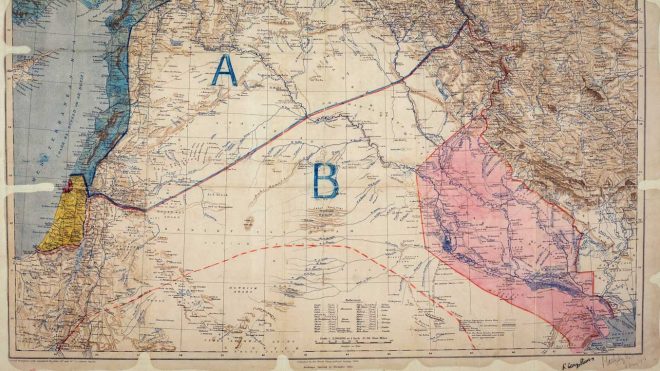Links » Kiser Insights » Blow Back
Blow Backby John Kiser Rappahannock News, June 22, 2017 To understand what is happening today in the Middle East, and throughout Europe, and the Muslim world generally . . . and yes in the U.S.A., consider two eternal axioms: 1) You reap what you sow; and 2) The friend of my enemy is my enemy. It was revealing that in Osama Bin Laden’s first video performance after 9/11, he explained the attack by referring to a secret agreement called Sykes Picot. Sykes Picot was an 80-year-old festering wound created when the French and British secretly agreed after World War I to divide up big hunks of the Ottoman Empire into littler ‘Indian reservations’ of their choosing (reader advisory: see the new film, “Letters from Baghdad,” re. the Gertrude Bell story).  Like here at home, the essential ingredient of the colonial mentality is contempt for the natives — whether in Iran, South Dakota, or yes Rappahannock — and manipulation of local politics. It is laughable that the Congress and National Public Radio are sounding the alarm over Russian meddling in our elections, when it was American and British meddling that produced the coup of 1953 that removed Iran’s premier (didn’t like the distribution of oil revenues) who was replaced by the Shah (our bulwark against the Commies) whose policies and politics led 25 years later to the Iranian Revolution that turned into the Axis of Evil. OooLalla. Subsequently, by invading Iraq twice, the U.S. had acquiredthe mantel of successor to the British as local bad guy in the eyes of our enemies. So why do they hate us? Actually the vast majority of Muslims don’t hate us. Many hate our international politics, as do quite a few Americans. Arabs can make distinctions between governments and ordinary people. Others find our culture vulgar and sex obsessed (my grandmother would have too). Americans are quick to express shock at barbaric beheadings, yet this form of execution was very traditional in Europe (into the 1960s the French used the guillotine) and very good at getting attention in the world press. Again, Bin Laden used U.S. behavior in World War II as his defense of his “barbaric” killing of innocent civilians (why is that more barbaric than shredding people with shrapnel?). You see, he was, and his successors are, fighting total war, only using primitive means. Low tech turns out to be very cost effective. Americans have forgotten that we too once waged total war. The last time the U.S. went all out to win, we were prepared to barbeque tens of thousand of men, women, and children in our firebombing campaigns, polishing it off in Japan with a few nukes that also killed “innocents” and deformed their offsprings. The advantage of total destruction and mass killings is that it makes the subject very compliant. Did we need to go that far? It felt good at the time. It served the “yellow bastards” right, as the Japs were called. Veterans of the Pacific war can still be found today. Many will not drive Japanese cars or eat in Japanese restaurants. Not hard to imagine how U.S. bombing is affecting attitudes in Iraq and Afghanistan — and among their relatives living in Europe and America. So who is ISIS attacking aside from the apostate Muslim governments that collaborate with a vulgar, narcissistic and debt driven western culture — one that sidelines God six days a week and trots Him/Her out for a show of piety on Friday or Sunday? Not Portugal or Iceland or Finland or Ireland or Scotland or Sweden . . . yet. They incite attacks in countries that have allied themselves with the U.S. occupation of Iraq and Afghanistan. How to not overreact and yet not underestimate the power of this struggle for a more God driven world, as conceived by the ultra conservative elements (Salafi Islam)? That will be the great challenge for the generation to come. The greatest danger comes from aggregating the enemy, which got us into Vietnam. Now we need to be disaggregating and differentiating. Communism was not one, Islam is not one, nor is Christianity, nor is America. It never was. Culture conflicts are going on all around the world — at home and abroad. They have many overlapping dimensions: urban vs. rural; traditional vs. modernizing; secular vs. sacred, cosmopolitan globalizing vs. community preservationist. One thing is clear to me . . . life is a spectrum, not a digital process. How we talk with each other is more important than what we say. As a French monk, Brother Christophe(“The Monks of Tibhirine: Faith Love and Terror in Algeria,” by your’s truly) would say: Truth that is wielded like a bludgeon overwhelms and is rejected. Truth should be humble. Jesus said, “I am gentle and humble of heart.” The Sykes Picot Middle East will never be the same again. How it ends up three or four years out will depend on how wise or foolish American leaders behave in this extraordinarily complex struggle within the Islamic world. Above all, this should not be America’s war. It is a war within Islam that is emerging to have the same scope and impact that tore Christendom apart 500 years ago and led to a secularized world. Is radical Islam the vanguard of a reversal? Just listen to Christ radio. This will not be a struggle that fits within two or four year election cycles . . . nor solved with technology or simple good guy/bad guy thinking. Only the wise need apply . . . but where are they? John Kiser is the author of numerous books, among them Communist Entrepreneurs: Unknown Innovators in the Global Economy, and Stefan Zweig: Death of Modern Man. A former international technology broker, he makes his home in Sperryville. |
